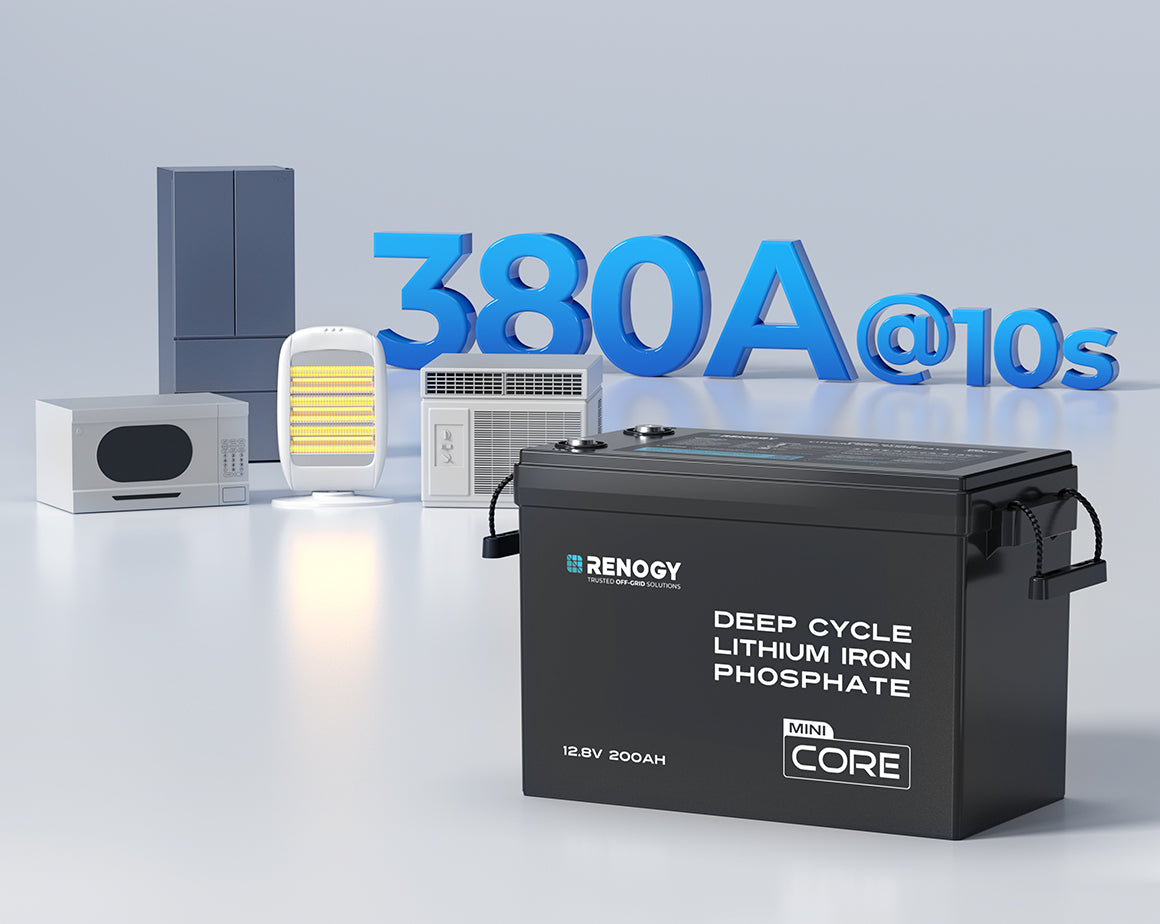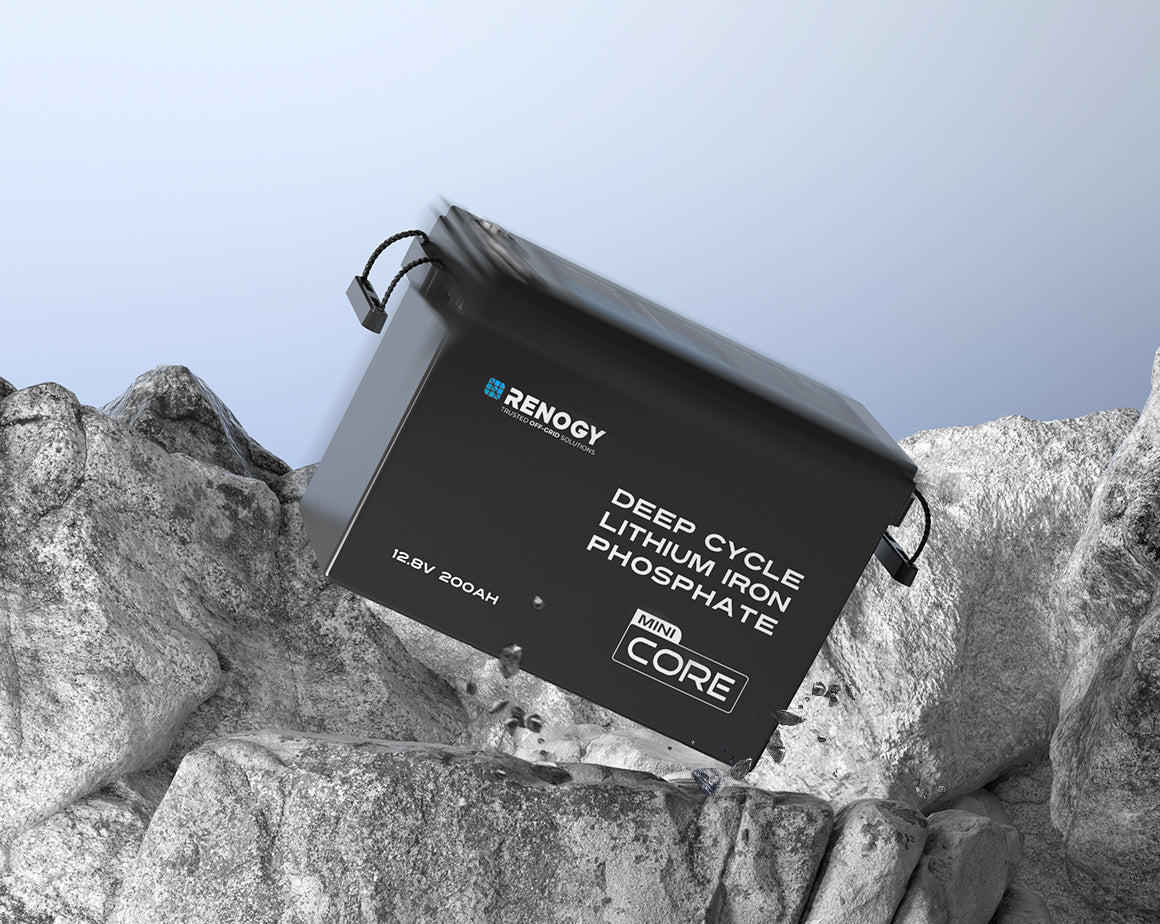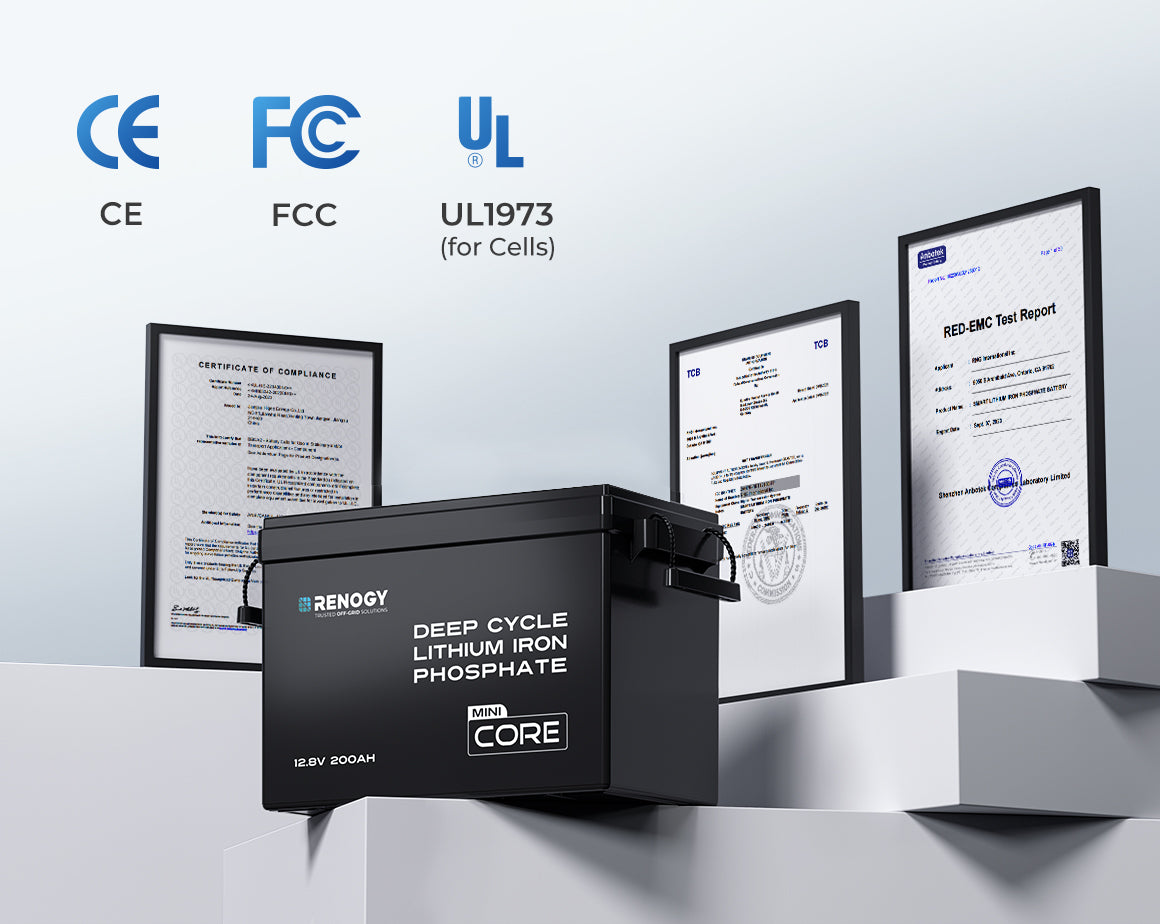Core Mini – 12.8V 200Ah Lithium Iron Phosphate (LiFePO4) Battery with Low Temperature Protection
- Plus compacte que jamais ! 1/3 plus petite qu’une batterie plomb-acide 12V 200Ah.
- BMS puissant de 200A, bien plus robuste qu’un modèle 100A. Protection contre les basses températures (charge et décharge).
- Étanche IP65 et résistante aux vibrations pour une performance optimale en extérieur.
- Certifiée FCC, UN38.3, ROHS, UKCA, et autres. Garantie 5 ans.
- Compatible avec le shunt batterie Renogy 300A pour une surveillance à distance.
Core Mini – 12.8V 200Ah Lithium Iron Phosphate (LiFePO4) Battery with Low Temperature Protection is backordered and will ship as soon as it is back in stock.
Compact, elegant, and still powerful with Renogy.
Power your needs with confidence with the Renogy Core Mini LiFePO4 12V 200Ah battery, which is 21% more compact than equivalent models while incorporating a robust 200A BMS and automatic low-temperature cut-off for enhanced protection. Ideal for travel and home use, it perfectly meets versatile energy needs.
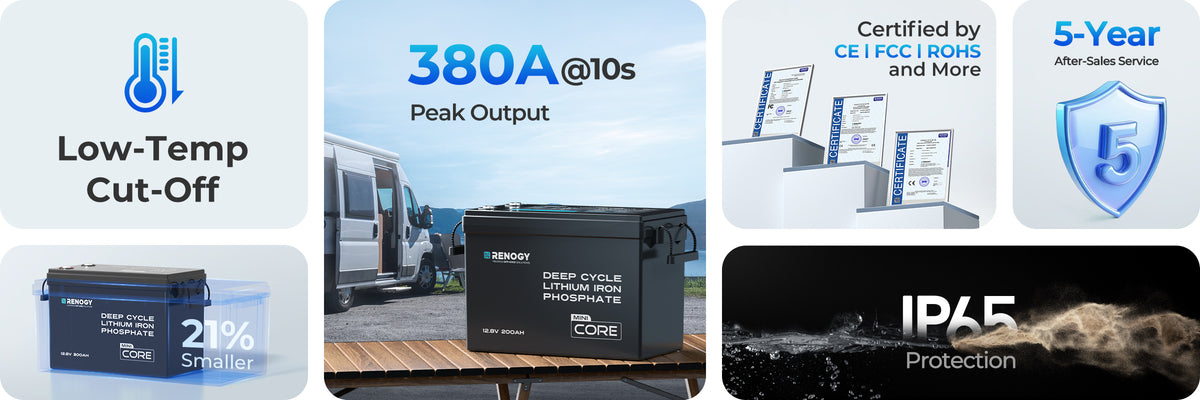
21% more compact than other models
Its compact and sleek design saves space, facilitates connections and maintenance, and adapts to different types of battery boxes, including 8D and 4D formats.
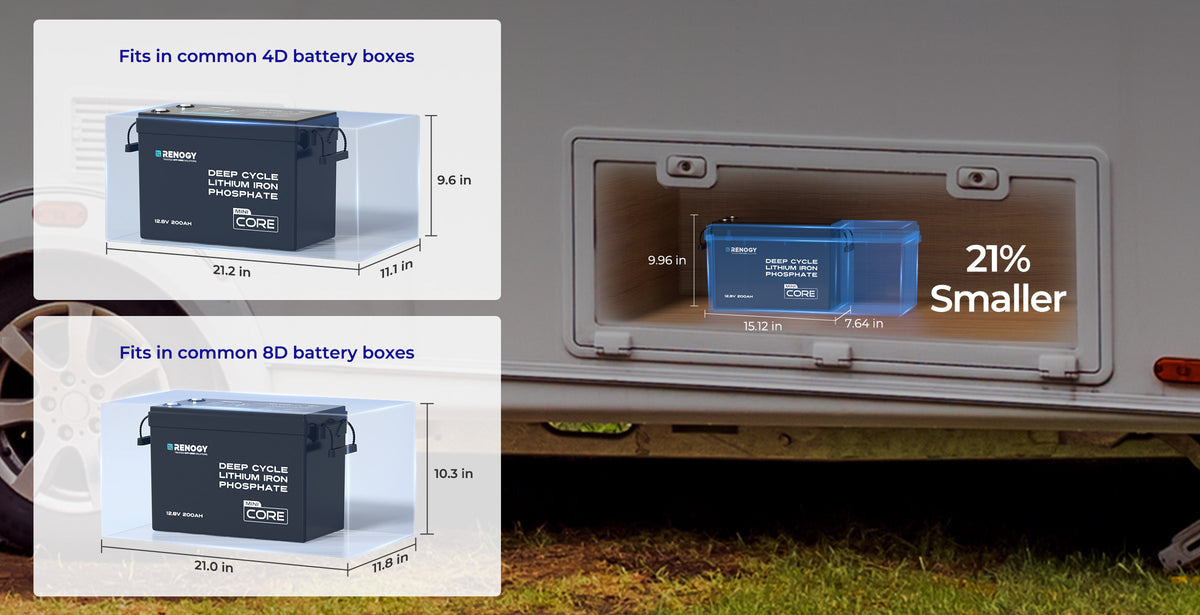
Automatic cut-off at low temperature, without intervention
The integrated BMS automatically shuts off the battery when temperatures drop too low. You'll no longer have to manually monitor your battery: enjoy your winter journeys with peace of mind while your battery protects itself.
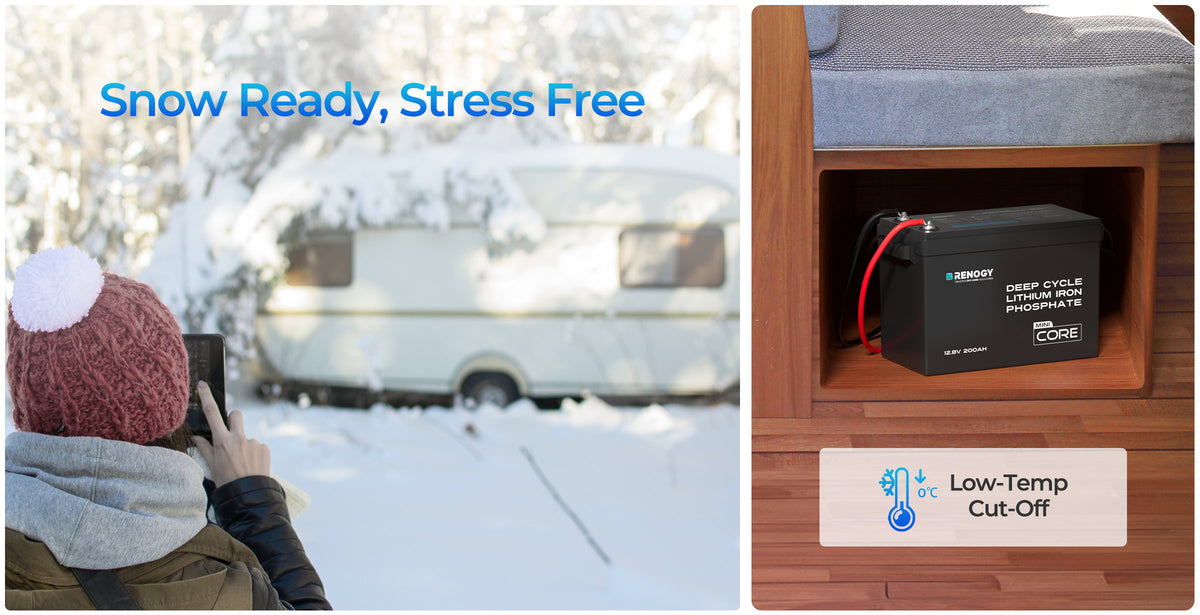
Package Contents
-
Lithium Iron Phosphate Battery 12V 200Ah
x 1
-
Long terminal bolts
x 2
-
Standard terminal bolts
x 2
-
User Manual
x 1
Spécifications techniques
Paramètres de température
Paramètres de charge
Paramètres de décharge
Garantie
Certifications
Frequently Asked Questions
1. I have 4 Renogy 100W 12V solar panels. Can I use them with this LiFePO4 battery or is it too powerful?
1. I have 4 Renogy 100W 12V solar panels. Can I use them with this LiFePO4 battery or is it too powerful?
Yes, it is possible. However, make sure your solar charge controller can handle the total power your panels can produce. Never connect solar panels directly to the battery without a charge controller. Please contact us for help sizing your controller correctly.
2. Can I connect multiple batteries in series to create a 48V system?
2. Can I connect multiple batteries in series to create a 48V system?
Yes, Renogy Core Mini 12V batteries can be connected in series to increase the voltage to a 24V, 36V, or 48V system. You can also combine batteries in series and then connect these series in parallel (identical models required) for a maximum capacity of up to 40.96 kWh.
3. How many Renogy 12V 200Ah Core Mini batteries can I connect at most?
3. How many Renogy 12V 200Ah Core Mini batteries can I connect at most?
This model supports series, parallel, and series-parallel connections. You can connect up to 4 batteries in series to increase voltage, or up to 8 batteries in parallel to increase capacity. For maximum flexibility, you can combine up to 16 batteries in a 4S × 4P configuration. All batteries must be the same model and of similar capacity.
4. What is the battery life of the Renogy Core Mini?
4. What is the battery life of the Renogy Core Mini?
Renogy Core Mini 12V 200Ah batteries offer up to 5000 charge/discharge cycles at a recommended depth of discharge of 80%. They incorporate a 200A BMS management system, IP65 protection and a robust structure for reliable use in outdoor and harsh conditions.
5. Can I connect a Bluetooth module to monitor the battery status from my smartphone?
5. Can I connect a Bluetooth module to monitor the battery status from my smartphone?
No, this battery is not compatible with a Bluetooth module. To monitor the battery status, you can use a battery monitor with a 500A shunt (sold separately).
6. How do I recharge my LiFePO4 batteries?
6. How do I recharge my LiFePO4 batteries?
Whether you are using solar charging, a DC-DC charger, or an AC-DC charger, we highly recommend a solar regulator/charger that is compatible with lithium iron phosphate batteries.
7. What should be kept in mind when connecting multiple batteries in series or parallel?
7. What should be kept in mind when connecting multiple batteries in series or parallel?
When wiring, use cables of the same length and cross-section to reduce resistance differences and ensure balanced current flow, especially when combining groups in parallel and then in series. Avoid mixing batteries of different brands, models, or ages. Differences in internal impedance or wear can cause imbalances, affecting performance and safety.


















